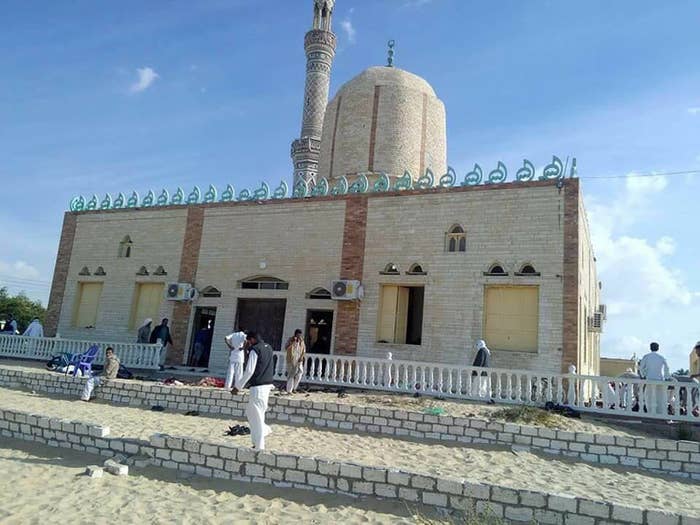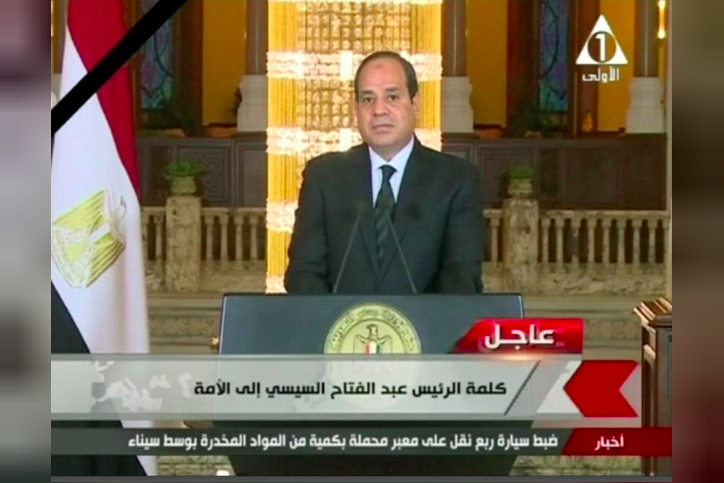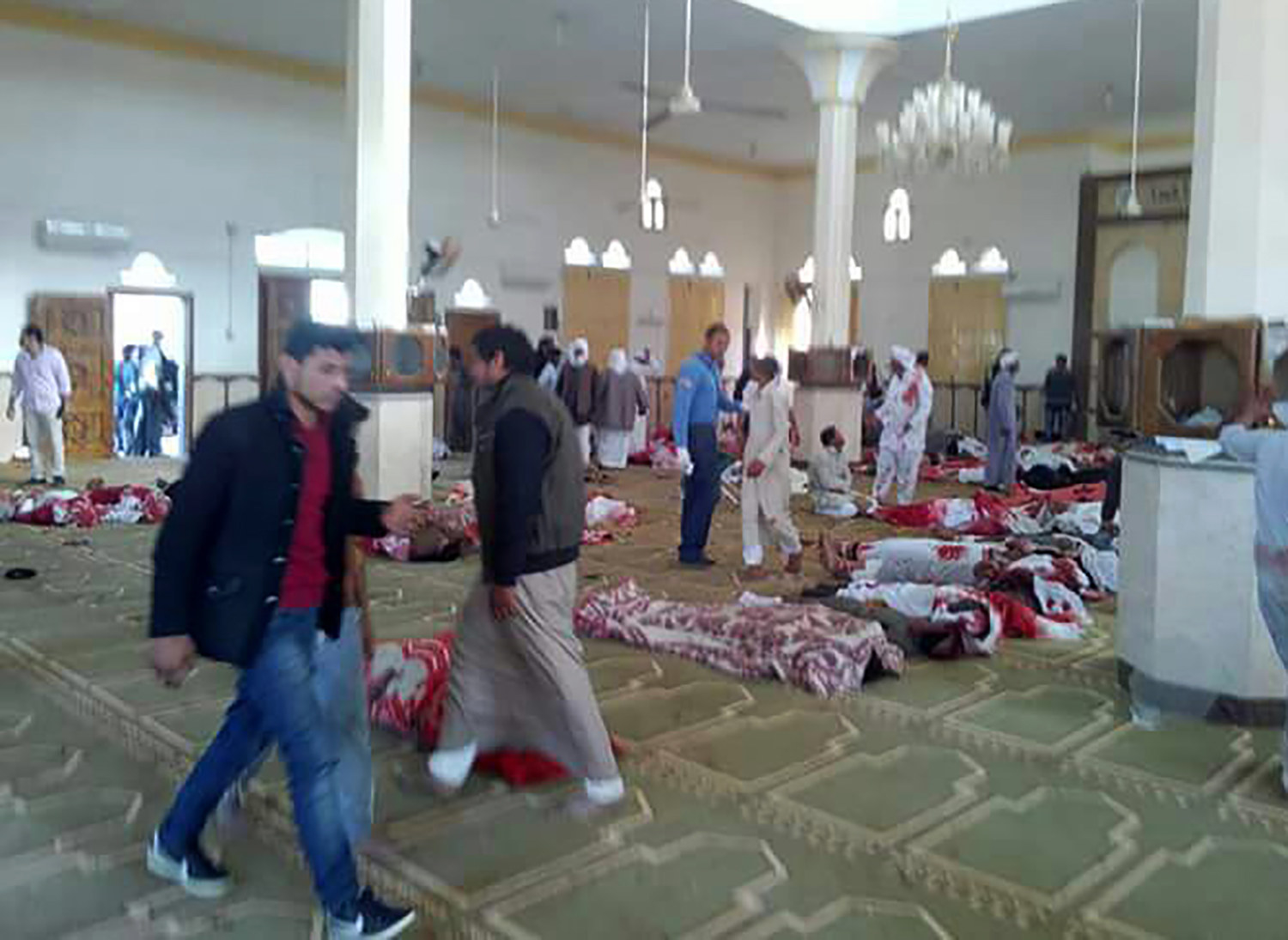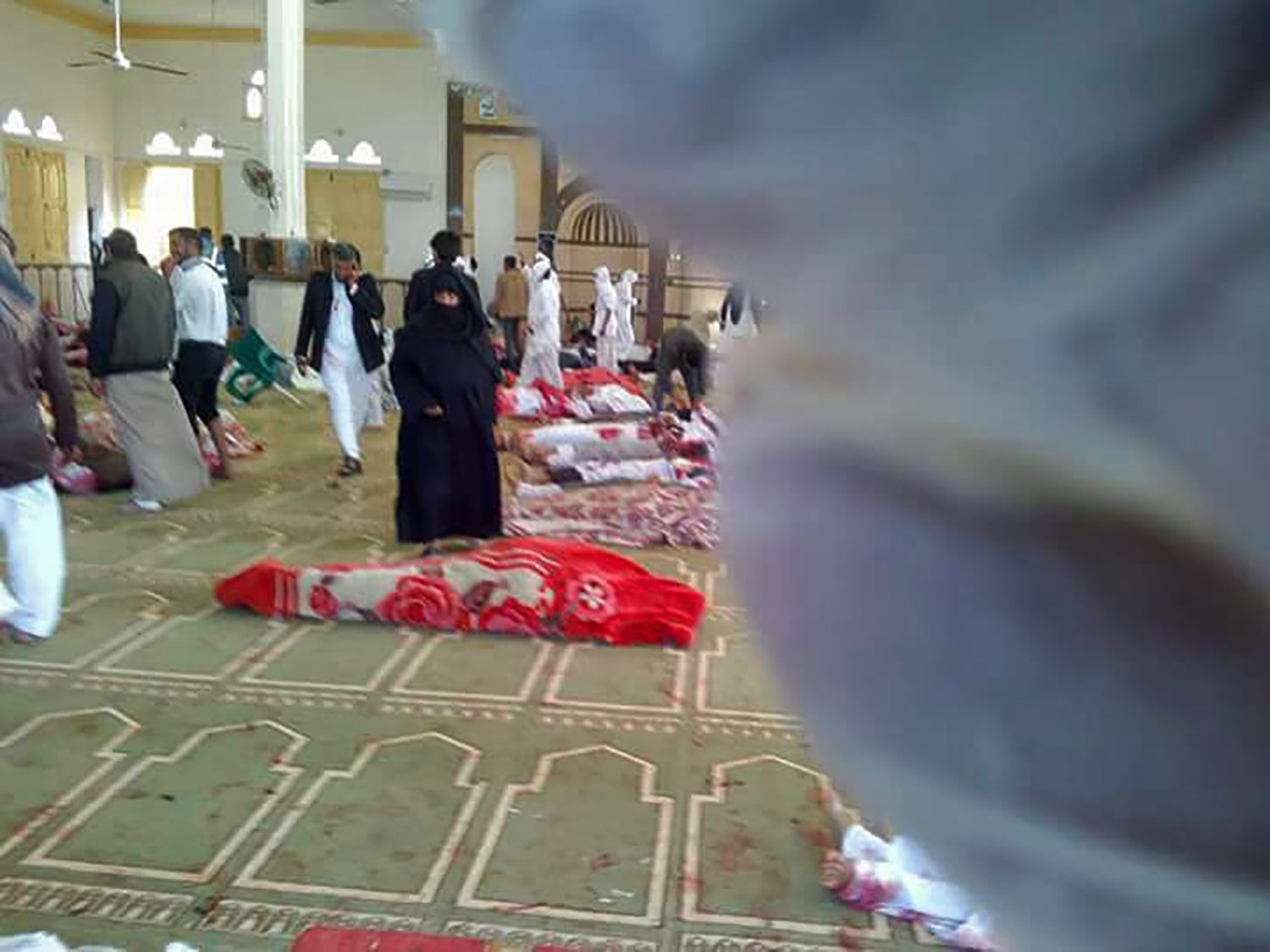
The Egyptian military says warplanes have struck vehicles used in a gun and bomb attack on a mosque in the Sinai peninsula on Friday, the deadliest attack in the country's modern history.
Egypt's chief prosecutor confirmed on Saturday that the attack on the Al Rawdah mosque in the small town of Bir al-Abd killed 305 people, including 27 children, and injured 126.
Between 25 and 30 militants carried out the attack, Nabil Sadeq said in a statement, timing their arrival to coincide with Friday prayers.
He added that the militants drove to the mosque in five all-terrain vehicles, positioned themselves at main entrance and windows, then opened fire on worshippers and torched seven cars parked outside.
There has been no immediate claim of responsibility, but the multi-pronged style of the attack bore the hallmarks of jihadi groups affiliated with ISIS and al-Qaeda.

Security forces said on Saturday that the military carried out air strikes in mountainous areas around the mosque and hit several vehicles in the vicinity of the attack, killing all passengers.
"The air force has over the past few hours eliminated a number of outposts used by terrorist elements," the army said.
The strikes follow Egypt’s President Abdel Fattah al-Sisi's promise on Friday to respond to the attack with "brutal strength".
Eyewitnesses told the privately run al-Yawm al-Sabah website that assailants had stormed the Al-Rawda mosque in the town of Bir al-Abd, and then detonated an explosive device.
Three police officers, cited by the Associated Press but wishing to remain anonymous, said that four men who had arrived in off-road vehicles opened fire on worshippers during the sermon.
The AFP reports eyewitness and officials describing a bomb going off in the mosque and gunmen waiting outside to shoot people trying to flee.
A state of emergency has been declared in Sinai and President Sisi declared three days of mourning for the victims of the blast.
The mosque was said to belong to the mystical Sufi school of Islam that is considered blasphemous by extremists including ISIS and the Wahhabi school of Islam propagated by neighboring Saudi Arabia.

President Sisi was due to meet with acting Prime Minister Mostafa Madbouly on Saturday and has ordered the establishment of a monument to honor the victims, according to MENA.
He was defiant in a televised address late on Friday, vowing the attack, one of the nation’s worst ever terror incidents, would not weaken the country.
“This painful, mean, and cowardly incident which aimed to destroy our spirit, destroy our strength, and doubt our ability; this incident, this sinful terrorist attack will increase our strength and our will to confront and fight terrorism,” Sisi said. “It will increase our persistence and unity. The armed forces and the police will retaliate for our martyrs and restore security and stability with the utmost power in the coming few days.”.
“The armed forces and the police will avenge our martyrs and restore security and stability with the utmost force,” Sisi said. “What is happening is an attempt to stop us from our efforts in the fight against terrorism, to destroy our efforts to stop the terrible criminal plan that aims to destroy what is left of our region.”
World leaders also quickly condemned the attack, with President Trump calling it "cowardly."
Horrible and cowardly terrorist attack on innocent and defenseless worshipers in Egypt. The world cannot tolerate t… https://t.co/73hMjYKjMI
And UK Prime Minister Theresa May denouncing it as "sickening."
Appalled by the sickening attack on a mosque in North Sinai. Condolences with all those in #Egypt affected by this evil and cowardly act.
Jordan's King Abdullah II called the massacre "heinous" and said Jordan “stands alongside Egypt to combat terrorism which threatens everyone,” according to MENA. Representatives from Yemen, Kuwait, Oman, Iraq, the United Arab Emirates, and Bahrain also extended condolences.
Egypt’s North Sinai has been a conflict zone off limits to journalists and other independent observers for several years.
The Egyptian army has been fighting an on-and-off war against insurgents and Bedouin tribes in the region for decades. The conflict tapered off after the 2011 uprising that brought down longtime President Hosni Mubarak, but gathered steam after the 2013 coup that toppled the Islamist president and brought Sisi to power.
Militants, including ISIS’s local affiliate, have carried out a relentless wave of attacks in Sinai since the coup, killing hundreds of soldiers, police, and civilians. They have also occasionally targeted religious minorities, including Egyptian Coptic Christians.
Egypt’s armed forces have been accused of grave human rights violations that have exacerbated tensions between locals and the Cairo government.
The attack taking place in the village of Bir-Abed, considerably beyond Sinai's main zone of conflict and ISIS's main arena of influence, showed disturbing novelties.
"If this is ISIS, this was an attempt to disrupt the safety and security of Egyptian citizens well outside of the area where it usually operates,” said Zack Gold, a Sinai expert at the Atlantic Council, a Washington think tank.
Gold said the attack was likely meant to terrorize religious minorities as well as undermine the authority of the Egyptian state. North Sinai has been under a state of emergency — with heavy-handed checkpoints and extraordinary powers granted to security forces — for several years. An attack like this signals that the draconian measures have inconvenienced people without improving security.
“Most Islamic State attacks have two purposes — either to show the power and authority of the group, or lack of control of legitimate authorities,” he said in a phone interview. “An attack of this nature says that you are not safe, the Egyptian state cannot keep you safe.”
In a separate case, Egypt sentenced seven Islamist militants to death by hanging on Saturday, convicted of involvement in the beheading of 21 Egyptian Christian workers in Libya in 2015.
The Cairo Criminal Court also charged the men, who belonged to the ISIS-affiliated "Matrouh cell", with setting up a local branch of ISIS and plotting terrorist attacks.
A further 13 militants were sentenced to prison terms ranging from 15 to 25 years.





